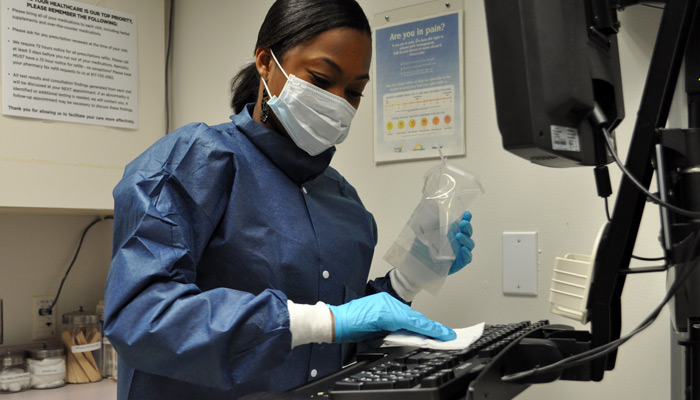Study: Bacteria found on high-touch areas in health facilities
A germ that causes fever and nausea can be found at health care facilities on bed rails, computer keyboards and door handles, according to a collaborative project from UNT Health Science Center and the Dallas-Fort Worth Hospital Council Foundation.
The study recommends more vigorous cleaning and infection control measures in health care facilities, and awareness campaigns about the bacteria, known as Clostridium difficile or C. diff. It also shows that clinics and hospitals need effective infection-control plans that prevent workers — who frequently touch keyboards and light switches — from spreading the bacteria to patients, said Kim Fulda, DrPH, Associate Professor of Family Medicine.
“This is the first study to look at environmental sampling of C. diff in both inpatient and outpatient settings,” said Dr. Fulda, who also is interim Executive Director of the North Texas Primary Care Practice-Based Research Network (NorTex). “We found that outpatient clinical settings had a higher prevalence of C. diff than hospitals.”
Cases of people stricken with C.diff are on the rise in North Texas. Because the illness most often occurs in people taking antibiotics or acid-suppressing medication, or who have contact with a contaminated environment, the collaboration focused on preventing infections in hospitals, primary care outpatient clinics and long-term care facilities. It was funded by a $236,000 contract from the DFW Hospital Council Foundation.
Health Science Center personnel collected 1,387 environmental samples from 33 facilities. The overall prevalence of C. diff was 5.2 percent, with the highest occurrences found in long-term care facilities, followed by clinics and then hospitals. High-touch areas like bed rails, bathroom faucets, sink handles and computer keyboards showed the highest prevalence, ranging from 5 percent to 9 percent.
The environmental samples were collected by NorTex, part of the UNTHSC Texas Prevention Institute. Joon Lee, PhD, Assistant Professor of Environmental and Occupation Health, and Jerry Simecka, PhD, Professor of Cell Biology and Immunology, provided expertise in this multidisciplinary project.
As part of the project, DFW Hospital Council Foundation launched a regional television, social media and website campaign about C. diff. From the hospital foundation, Sushma Sharma, PhD, Director of Public and Population Health, and Patti Taylor, MHA, RRT, Director of Quality and Patient Safety, assisted in the project.
***
This project was funded by a Dallas- Fort Worth Hospital Council Foundation contract with the Centers for Medicare and Medicaid Services (CMS), an agency of the U.S. Department of Health and Human Services. Contract Number HHSM-500-2012-0025 Hospital Engagement Network Contractor for Partnership for Patients Initiative.






Social media